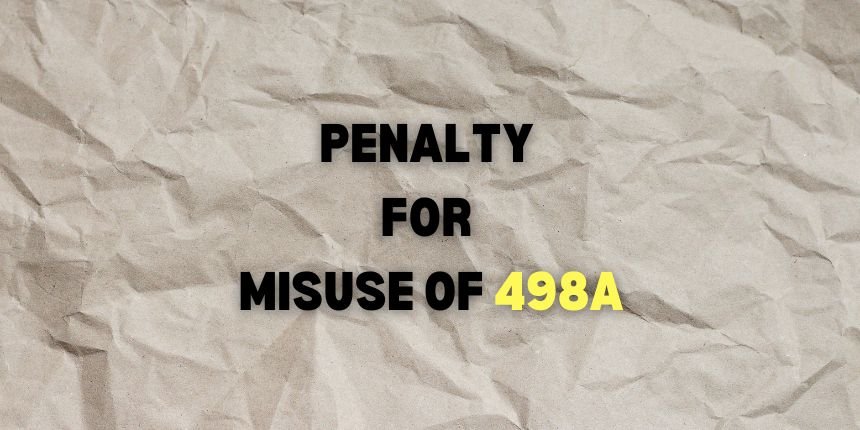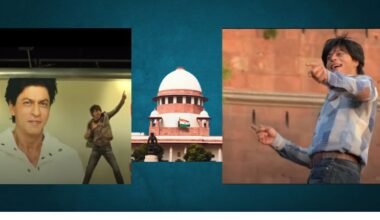Women out there…..Is your marriage not working on your own terms? Do you want to make your husband and his family unilaterally pay for it? Go for misuse of IPC Section 498A.
The aforementioned words may sound harsh, but TADAA…..that’s the sad reality of our world. Although some of us wish to run away from it, some men and their families have to deal with it one-on-one, most of the time without any fault. The misuse of 498A has been obvious and didn’t go unnoticed by the Courts. While most of the times Courts highlighted the false Section 498A cases, there have been times when they went a step ahead by imposing costs. To get into details, let’s get to step one on how the provision is misused.
What is the misuse of Section 498A IPC?
The Section 498A of the Indian Penal Code, 1860 aims at punishing the husband and relatives who subject a married woman to cruelty. It is termed as cruelty when such behavior is likely to drive the woman to commit suicide or to cause grave injury or danger to the woman, or it is targeted at unlawful demands of dowry.
While the provision aims at protecting women against cruelty at the hands of her husband and his family, data hints at very less conviction. In other words, there have been more cases wherein the woman was not really harassed by the husband or anyone of the in-laws, but she avenged the falling marital relations by falsely prosecuting them. The law is more women centric, assuming that a woman can only be a victim and not a perpetrator. Thus, the husband and his family are tagged as wrongdoers immediately after such cases are filed. And that is how women misuse Section 498A of IPC.
Also read – Is extra-marital affair legal in India?
Punishment for Misuse of 498A
Since the misuse of IPC Section 498A has become a frequent affair, even the Courts have imposed costs upon such a wife harassing her husband by abusing the due process of law. Such cases help aggrieved husbands with the answer to how to deal with a fake 498A case. Below are some of the instances when Courts relieved the husband by quashing false cases of Section 498A IPC and imposed cost on the wife.
Rs 5 lakh cost by Supreme Court
In a recent case of Parteek Bansal v. State of Rajasthan (decided on April 19, 2024), the Apex Court imposed a cost of Rs 5 lakhs. The Court came heavily upon the father daughter duo who harassed the husband for registering FIR at two different cities (at Rajasthan’s Udaipur and Haryana’s Hisar). The Supreme Court particularly deprecated the misuse of State machinery “for ulterior motives and for causing harassment to the other side”.
Rs 1 lakh cost by Madhya Pradesh High Court
In Anshul v. State of Madhya Pradesh Station House Officer through Police Station Vijal (decided on March 1, 2024), the MP High Court slapped cost of Rs 1 lakh upon the wife for misuse of Section 498A of IPC. Getting into the background, the wife initially agreed to a settlement for mutual divorce wherein she would be getting Rs 50 lakhs from her husband, and withdraw all the cases against the husband and his family in return. While she received the amount and mutual consent divorce was decreed, the cases were not withdrawn. Looking at the facts of the case and the point where she could not prove forced miscarriage, the Court quashed the criminal case against the husband and his family and imposed a cost of Rs 1 lakh against the wife.
Rs 25,000 cost by Karnataka High Court
While dealing with the case of Faisal Ahmed Khan v. State of Karnataka (decided on October 11, 2019), the High Court directed the wife to pay the cost of Rs 25,000 to her husband. The Court regarded the matter as an “unfortunate case of a highly harassed husband by abuse of process of law”. Facts of the case reveal that it was the wife’s third marriage and that the wife did not reveal to her third husband that she was restrained from marrying again during pendency of matter with her ex-husband as per a Court order. The High Court imposed a cost on the wife to be paid to her husband for harassment and abuse of process.
Inference
Misuse of IPC Section 498A cannot be denied by anyone. However, decisions like the aforementioned bring a sigh of relief for families who are struggling with vengeful wives. Such strictness is the need of the hour for reducing the gender gap in justice for matrimonial disputes.








